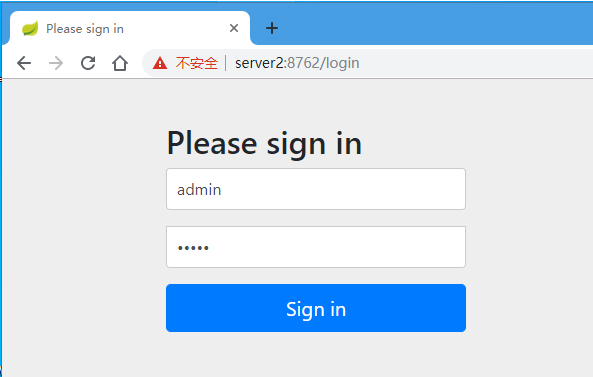一、 什么是服务注册中心
服务注册中心是服务实现服务化管理的核心组件,类似于目录服务的作用,主要用来存储服务信息,譬如提供者url串、路由信息等。服务注册中心是SOA架构中最基础的设施之一。
1 服务注册中心的作用
1,服务的注册
2,服务的发现
2. 常见的注册中心有哪些
1,Dubbo 的注册中心Zookeeper
2,Sringcloud的注册中心Eureka
3. 服务注册中心解决了什么问题
- 服务管理;
- 服务的依赖关系管理;
4. 什么是Eureka注册中心
Eureka是Netflix开发的服务发现组件,本身是一个基于REST的服务。Spring Cloud将它集成在其子项目spring-cloud-netflix中,以实现Spring Cloud的服务注册与发现,同时还提供了负载均衡、故障转移等能力。
5. Eureka注册中心三种角色
5.1 Eureka Server
通过Register、Get、Renew等接口提供服务的注册和发现。
5.2 Application Service (Service Provider)
服务提供方
把自身的服务实例注册到Eureka Server中
5.3 Application Client (Service Consumer)
服务调用方
通过Eureka Server 获取服务列表,消费服务。
二、 Eureka入门案例
1、创建项目
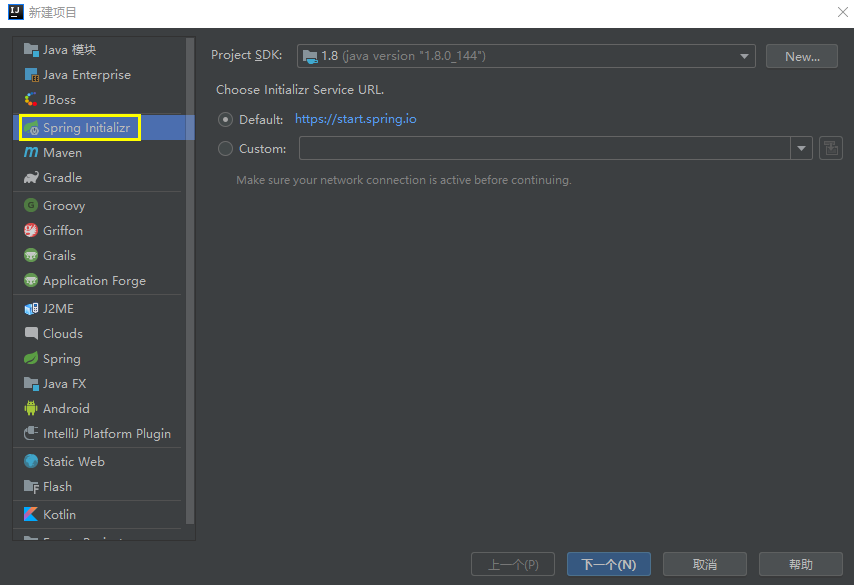
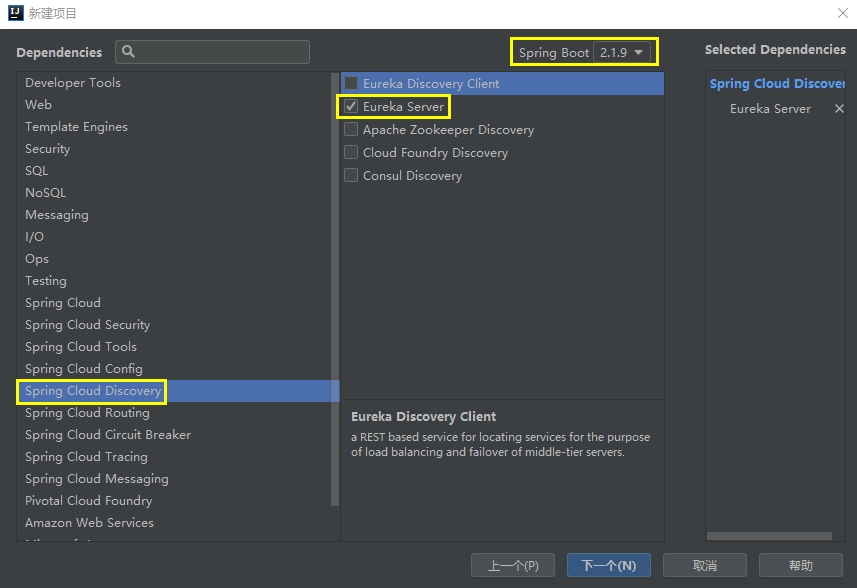
2、pom.xml文件如下
1 <?xml version="1.0" encoding="UTF-8"?> 2 <project xmlns="http://maven.apache.org/POM/4.0.0" xmlns:xsi="http://www.w3.org/2001/XMLSchema-instance" 3 xsi:schemaLocation="http://maven.apache.org/POM/4.0.0 https://maven.apache.org/xsd/maven-4.0.0.xsd"> 4 <modelVersion>4.0.0</modelVersion> 5 <parent> 6 <groupId>org.springframework.boot</groupId> 7 <artifactId>spring-boot-starter-parent</artifactId> 8 <version>2.1.9.RELEASE</version> 9 <relativePath/> <!-- lookup parent from repository --> 10 </parent> 11 <groupId>com.angei</groupId> 12 <artifactId>eurekaserver</artifactId> 13 <version>0.0.1-SNAPSHOT</version> 14 <name>eurekaserver</name> 15 <description>Demo project for Spring Boot</description> 16 17 <properties> 18 <java.version>1.8</java.version> 19 <spring-cloud.version>Greenwich.SR3</spring-cloud.version> 20 </properties> 21 22 <dependencies> 23 <dependency> 24 <groupId>org.springframework.cloud</groupId> 25 <artifactId>spring-cloud-starter-netflix-eureka-server</artifactId> 26 </dependency> 27 28 <dependency> 29 <groupId>org.springframework.boot</groupId> 30 <artifactId>spring-boot-starter-test</artifactId> 31 <scope>test</scope> 32 </dependency> 33 </dependencies> 34 35 <dependencyManagement> 36 <dependencies> 37 <dependency> 38 <groupId>org.springframework.cloud</groupId> 39 <artifactId>spring-cloud-dependencies</artifactId> 40 <version>${spring-cloud.version}</version> 41 <type>pom</type> 42 <scope>import</scope> 43 </dependency> 44 </dependencies> 45 </dependencyManagement> 46 47 <build> 48 <plugins> 49 <plugin> 50 <groupId>org.springframework.boot</groupId> 51 <artifactId>spring-boot-maven-plugin</artifactId> 52 </plugin> 53 </plugins> 54 </build> 55 56 </project>
提示:如果IDEA加载pom.xml时一直下载失败,可以在pom.xml中添加如下配置,使其从国内阿里云镜像中下载相关内容,下载速率将会大幅提升。
<repositories>
<repository>
<id>aliyun</id>
<name>aliyun</name>
<url>https://maven.aliyun.com/repository/public</url>
</repository>
</repositories>
3、添加application.yml全局配置文件
1 server: 2 port: 8761 3 eureka: 4 instance: 5 appname: provider-service 6 hostname: localhost 7 client: 8 service-url: 9 defaultZone: 10 http://localhost:8761/eureka/ 11 register-with-eureka: false 12 fetch-registry: false
说明:
1 server: 2 port: 8761 3 eureka: 4 instance: 5 #服务名,默认取 spring.application.name 配置值,如果没有则为 unknown 6 appname: provider-service 7 #设置当前实例的主机名称 8 hostname: localhost 9 client: 10 service-url: 11 #指定服务注册中心地址,类型为 HashMap,并设置有一组默认值, 12 #默认的Key为 defaultZone;默认的Value为 http://localhost:8761/eureka , 13 #如果服务注册中心为高可用集群时,多个注册中心地址以逗号分隔。 14 defaultZone: 15 http://localhost:8761/eureka/ 16 17 #是否将自己注册到Eureka-Server中,默认的为true 18 register-with-eureka: false 19 20 #是否从Eureka-Server中获取服务注册信息,默认为true 21 fetch-registry: false
细节注意:

4、修改启动类
1 import org.springframework.boot.SpringApplication; 2 import org.springframework.boot.autoconfigure.SpringBootApplication; 3 import org.springframework.cloud.netflix.eureka.server.EnableEurekaServer; 4 5 @SpringBootApplication 6 @EnableEurekaServer 7 public class EurekaserverApplication { 8 9 public static void main(String[] args) { 10 SpringApplication.run(EurekaserverApplication.class, args); 11 } 12 13 }
5、通过浏览器访问Eureka-Server服务管理平台
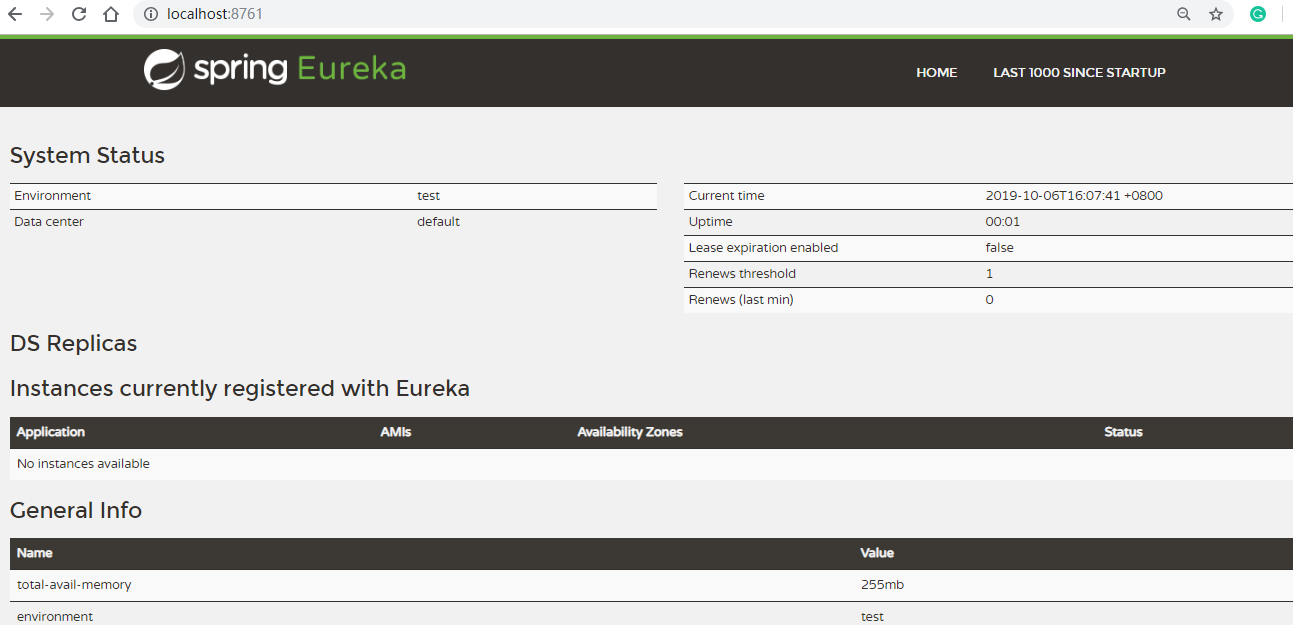
三、 搭建高可用Eureka注册中心(Eureka集群)
在微服务架构中,注册中心是一个必不可少的组件,前面我们搭建的注册中心只适合本地开发使用,在生产环境必须搭建一个集群来保证高可用。
Eureka的集群搭建很简单,每一台Eureka都需要在配置中指定另外N个Eureka的地址就可以。
在Eureka服务端的配置项eureka.client.serviceUrl.defaultZone中地址那一行要使用ip或域名,由于这里是在本地一台机子上模拟集群环境,ip地址都一样,所以通过更改本地host文件的方式创建三个可用的域名。
1.修改C:WindowsSystem32driversetchosts文件:
127.0.0.1 server1 127.0.0.1 server2 127.0.0.1 server3
2.本地刷新dns:
指令: ipconfig /flushdns
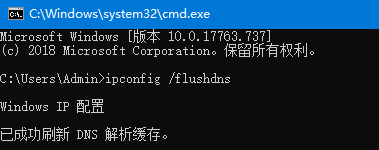

3.创建3个application.yml
注意:在集群环境下,每一个Eureka都需要将自己注册到Eureka-Server中(register-with-eureka默认就是true故可不配置)、也要从Eureka-Server中获取服务注册信息(fetch-registry默认就是true故可不配置)。
application-p8761.yml
server: port: 8761 eureka: instance: #服务名,默认取 spring.application.name 配置值,如果没有则为 unknown appname: provider-service #设置当前实例的主机名称 hostname: server1 client: service-url: #指定服务注册中心地址,类型为 HashMap,并设置有一组默认值, #默认的Key为 defaultZone;默认的Value为 http://localhost:8761/eureka , #如果服务注册中心为高可用集群时,多个注册中心地址以逗号分隔,地址形式是ip或域名:端口号 defaultZone: http://server2:8762/eureka/,http://server3:8763/eureka/
application-p8762.yml
server: port: 8762 eureka: instance: appname: provider-service hostname: server2 client: service-url: defaultZone: http://server1:8761/eureka/,http://server3:8763/eureka/
application-p8763.yml
server: port: 8763 eureka: instance: appname: provider-service hostname: server3 client: service-url: defaultZone: http://server1:8761/eureka/,http://server2:8762/eureka/
4.然后需要注意,application-xxxx.yml不是默认的配置形式,是无法被自动识别的,可以通过配置spring.profiles.active的方式指定运行时加载。
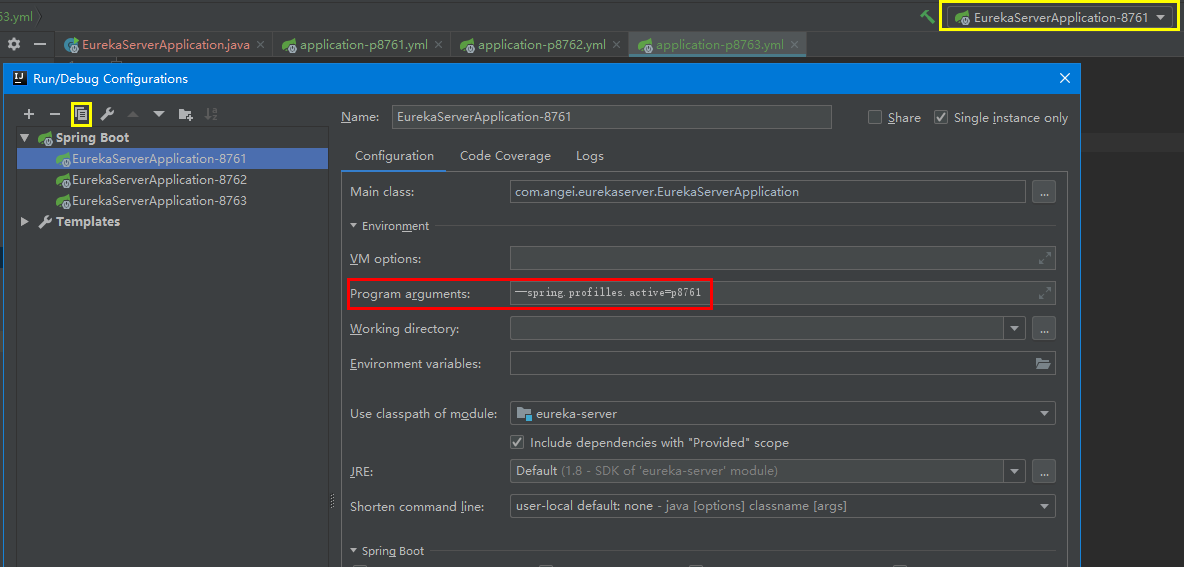
5.分别启动pEurekaServerApplication-8761, EurekaServerApplication-8762, EurekaServerApplication-8763

显示如下:

6.同时,在客户端的配置项中设置服务注册中心地址时,设置为哪一个都可以,最好都写上(用逗号隔开),这样当其中一个节点挂了,客户端还会自动尝试连接其他节点。
server: port: 80 spring: application: name: order-service eureka: client: service-url: #设置服务注册中心地址 defaultZone: http://localhost:8761/eureka/,http://localhost:8762/eureka/,http://localhost:8763/eureka/

四、 在Eureka注册中心中构建客户端服务
Eureka客户端开发要点:
①、maven 依赖 spring-cloud-starter-netflix-eureka-client;
②、application.yml 配置 eureka.client.service-url.defaultZone;
③、入口类増加 @EnableEurekaClient;
1、创建项目
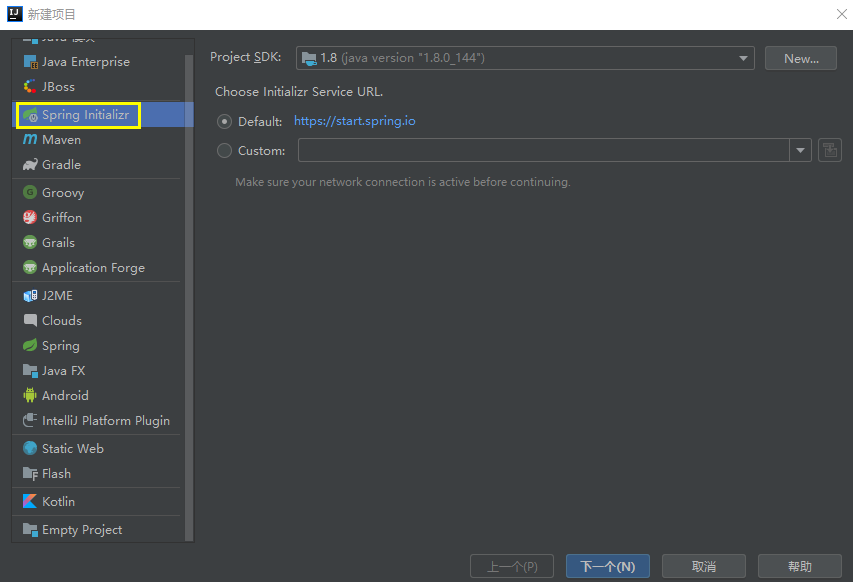
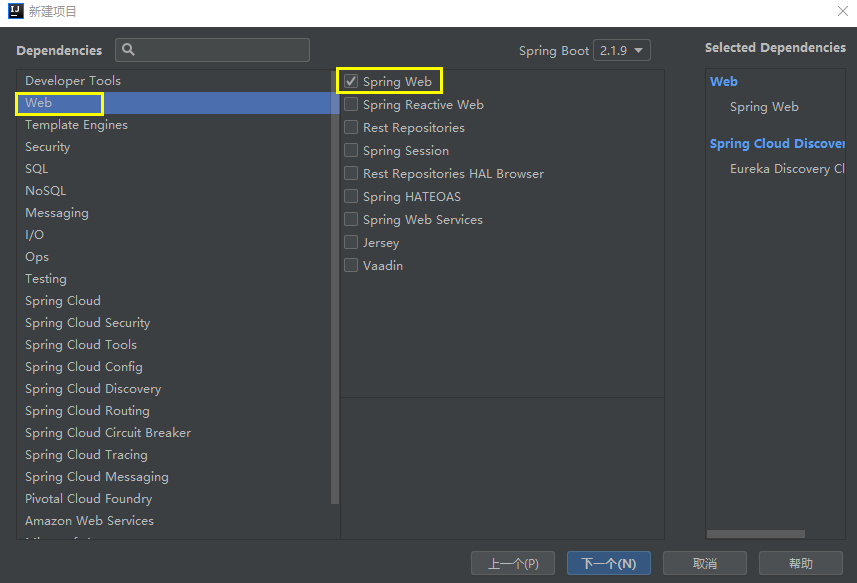
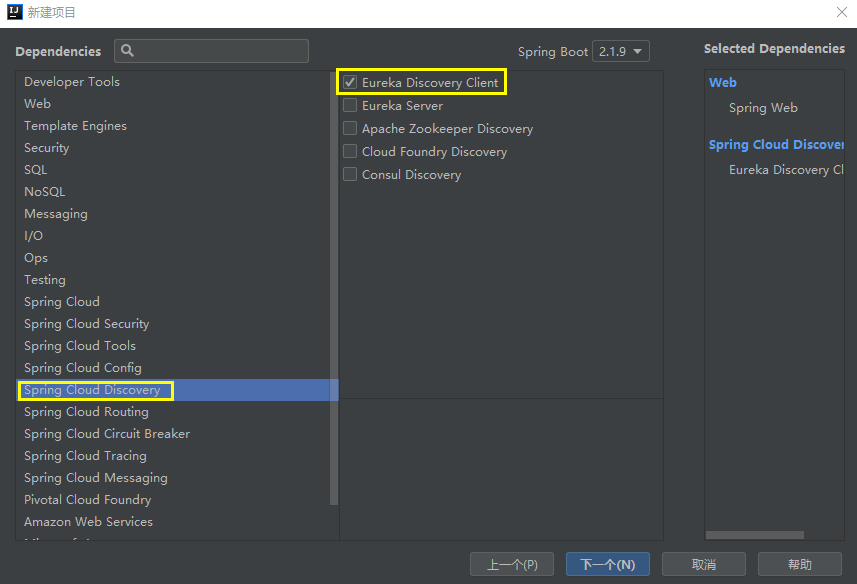
2、pom.xml文件如下
1 <?xml version="1.0" encoding="UTF-8"?> 2 <project xmlns="http://maven.apache.org/POM/4.0.0" xmlns:xsi="http://www.w3.org/2001/XMLSchema-instance" 3 xsi:schemaLocation="http://maven.apache.org/POM/4.0.0 https://maven.apache.org/xsd/maven-4.0.0.xsd"> 4 <modelVersion>4.0.0</modelVersion> 5 <parent> 6 <groupId>org.springframework.boot</groupId> 7 <artifactId>spring-boot-starter-parent</artifactId> 8 <version>2.1.9.RELEASE</version> 9 <relativePath/> <!-- lookup parent from repository --> 10 </parent> 11 <groupId>com.angei</groupId> 12 <artifactId>eureka-client</artifactId> 13 <version>0.0.1-SNAPSHOT</version> 14 <name>eureka-client</name> 15 <description>Demo project for Spring Boot</description> 16 17 <properties> 18 <java.version>1.8</java.version> 19 <spring-cloud.version>Greenwich.SR3</spring-cloud.version> 20 </properties> 21 22 <dependencies> 23 <dependency> 24 <groupId>org.springframework.boot</groupId> 25 <artifactId>spring-boot-starter-web</artifactId> 26 </dependency> 27 <dependency> 28 <groupId>org.springframework.cloud</groupId> 29 <artifactId>spring-cloud-starter-netflix-eureka-client</artifactId> 30 </dependency> 31 32 <dependency> 33 <groupId>org.springframework.boot</groupId> 34 <artifactId>spring-boot-starter-test</artifactId> 35 <scope>test</scope> 36 </dependency> 37 </dependencies> 38 39 <dependencyManagement> 40 <dependencies> 41 <dependency> 42 <groupId>org.springframework.cloud</groupId> 43 <artifactId>spring-cloud-dependencies</artifactId> 44 <version>${spring-cloud.version}</version> 45 <type>pom</type> 46 <scope>import</scope> 47 </dependency> 48 </dependencies> 49 </dependencyManagement> 50 51 <build> 52 <plugins> 53 <plugin> 54 <groupId>org.springframework.boot</groupId> 55 <artifactId>spring-boot-maven-plugin</artifactId> 56 </plugin> 57 </plugins> 58 </build> 59 60 </project>
3、添加application.yml全局配置文件
1 server: 2 port: 80 3 spring: 4 application: 5 name: order-service 6 eureka: 7 client: 8 service-url: 9 #设置服务注册中心地址 10 defaultZone: 11 http://localhost:8761/eureka/
4、修改启动类
1 import org.springframework.boot.SpringApplication; 2 import org.springframework.boot.autoconfigure.SpringBootApplication; 3 import org.springframework.cloud.netflix.eureka.EnableEurekaClient; 4 5 @SpringBootApplication 6 @EnableEurekaClient 7 public class EurekaClientApplication { 8 public static void main(String[] args) { 9 SpringApplication.run(EurekaClientApplication.class, args); 10 } 11 }
5、测试
1 package com.angei.eurekaclient.Controller; 2 3 import org.springframework.stereotype.Controller; 4 import org.springframework.web.bind.annotation.GetMapping; 5 import org.springframework.web.bind.annotation.PathVariable; 6 import org.springframework.web.bind.annotation.ResponseBody; 7 8 @Controller 9 public class orderController { 10 11 @GetMapping("/order/{id}") 12 @ResponseBody 13 public String findById(@PathVariable("id") Integer orderId){ 14 if(orderId==2019){ 15 return "{"Id":1,"Title":"饿了么订单"}"; 16 }else{ 17 return null; 18 } 19 } 20 }
先启动服务器,再启动客户端:

五、 在高可用的Eureka注册中心中模拟构建provider服务和consumer服务
(一)搭建provider提供服务
1.搭载环境



配置application.properties,将服务注册到注册中心。
spring.application.name=eureka-provider server.port=9090 #设置服务注册中心地址 eureka.client.serviceUrl.defaultZone=http://server1:8761/eureka/,http://server2:8762/eureka/,http://server3:8763/eureka/
2.模拟提供服务
创建User实体类:
1 import lombok.Getter; 2 import lombok.Setter; 3 import java.io.Serializable; 4 5 @Getter 6 @Setter 7 public class User implements Serializable { 8 9 private int id; 10 11 private String name; 12 13 public User() { 14 } 15 16 public User(int id, String name) { 17 this.id = id; 18 this.name = name; 19 } 20 21 @Override 22 public String toString() { 23 return "学号:" + this.id + " 姓名:" + this.name; 24 } 25 }
创建userController:
1 import com.example.demo.pojo.User; 2 import org.springframework.stereotype.Controller; 3 import org.springframework.web.bind.annotation.RequestMapping; 4 import org.springframework.web.bind.annotation.RestController; 5 6 import java.util.ArrayList; 7 8 @Controller 9 @RestController 10 public class userController { 11 12 @RequestMapping("/getAllUser") 13 public ArrayList<User> getAllUser() { 14 ArrayList<User> list = new ArrayList<>(); 15 list.add(new User(2018, "Benjieming")); 16 list.add(new User(2019, "Huangsi")); 17 list.add(new User(2020, "Yangyi")); 18 return list; 19 20 } 21 }
3.启动项目并检测

(二) 搭建consumer调用服务
1.创建项目,过程同provider,最终项目结构如下:
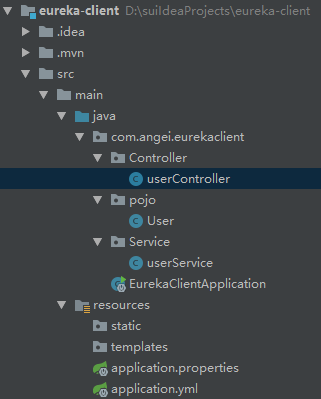
application.yml内容如下:
server: port: 9091 spring: application: name: eureka-consumer eureka: client: service-url: #设置服务注册中心地址 defaultZone: http://server1:8761/eureka/,http://server2:8762/eureka/,http://server3:8763/eureka/
2.创建userService和userController
userService.java
1 package com.angei.eurekaclient.Service; 2 3 import com.angei.eurekaclient.pojo.User; 4 import org.springframework.beans.factory.annotation.Autowired; 5 import org.springframework.cloud.client.ServiceInstance; 6 import org.springframework.cloud.client.loadbalancer.LoadBalancerClient; 7 import org.springframework.core.ParameterizedTypeReference; 8 import org.springframework.http.HttpMethod; 9 import org.springframework.http.ResponseEntity; 10 import org.springframework.stereotype.Service; 11 import org.springframework.web.client.RestTemplate; 12 13 import java.util.List; 14 15 @Service 16 public class userService { 17 18 @Autowired 19 private LoadBalancerClient loadBalancerClient;//ribbon负载均衡器 20 21 public List<User> getUsers() { 22 23 //选择调用的服务的名称 24 //ServiceInstance类封装了服务的基本信息,如 IP,端口等 25 ServiceInstance si = this.loadBalancerClient.choose("eureka-provider"); 26 //拼接访问服务的URL 27 StringBuffer sb = new StringBuffer(); 28 //http://server1:8761/getAllUser 29 System.out.println("host:" + si.getHost()); 30 System.out.println("Port:" + si.getPort()); 31 sb.append("http://").append(si.getHost()).append(":").append(si.getPort()).append("/getAllUser"); 32 33 34 //springMVC RestTemplate 35 RestTemplate rt = new RestTemplate(); 36 37 ParameterizedTypeReference<List<User>> type = new ParameterizedTypeReference<List<User>>() { 38 }; 39 40 //ResponseEntity:封装了返回值信息 41 ResponseEntity<List<User>> response = rt.exchange(sb.toString(), HttpMethod.GET, null, type); 42 List<User> list = response.getBody(); 43 return list; 44 } 45 }
注意:这里是向注册中心获取服务并拉取信息。
userController.java
1 package com.angei.eurekaclient.Controller; 2 3 import com.angei.eurekaclient.Service.userService; 4 import com.angei.eurekaclient.pojo.User; 5 import org.springframework.web.bind.annotation.RequestMapping; 6 import org.springframework.web.bind.annotation.RestController; 7 8 import javax.annotation.Resource; 9 import java.util.List; 10 11 @RestController 12 public class userController { 13 14 @Resource 15 private userService userservice; 16 17 @RequestMapping("/getAllUsers") 18 public List<User> getUsers(){ 19 return userservice.getUsers(); 20 } 21 }
3.启动项目并测试

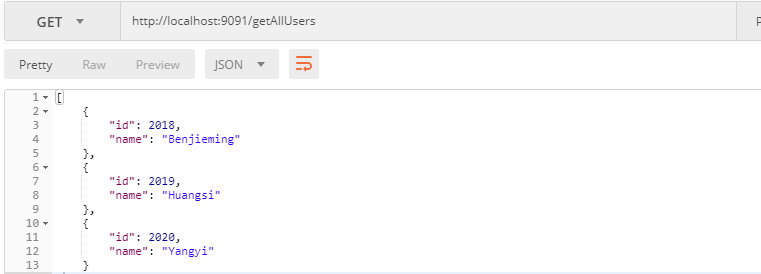
五、 Eureka注册中心架构原理
1、Eureka架构图

说明:
Register(服务注册):把自己的IP和端口注册给Eureka。
Renew(服务续约):发送心跳包,每30秒发送一次。告诉Eureka自己还活着。
Cancel(服务下线):当provider关闭时会向Eureka发送消息,把自己从服务列表中删除。防止consumer调用到不存在的服务。
Get Registry(获取服务注册列表):获取其他服务列表。
Replicate(集群中数据同步):eureka集群中的数据复制与同步。
Make Remote Call(远程调用):完成服务的远程调用。
2、CAP原则
CAP原则又称CAP定理,指的是在一个分布式系统中,Consistency(一致性)、 Availability(可用性)、Partition tolerance(分区容错性),三者不可兼得。
CAP由Eric Brewer在2000年PODC会议上提出。该猜想在提出两年后被证明成立,成为我们熟知的CAP定理。


3、基于分布式CAP定理,分析注册中心两大主流框架:分析Eureka与Zookeeper的区别
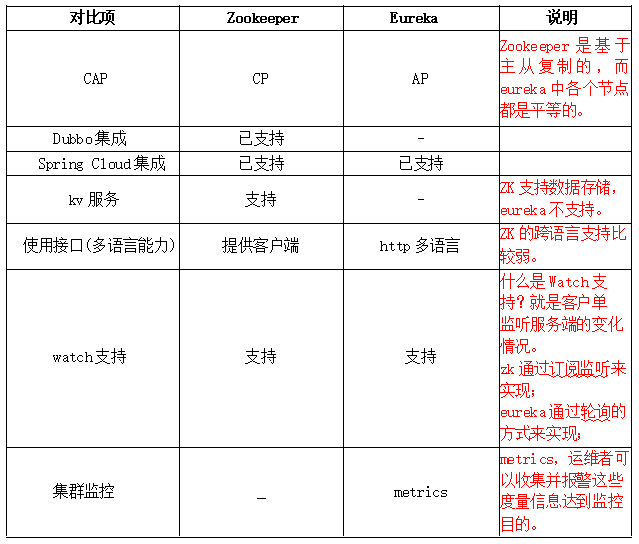
六、 Eureka优雅停服
1、在什么条件下,Eureka会启动自我保护?
什么是自我保护模式
1,自我保护的条件
一般情况下,微服务在Eureka上注册后,会每30秒发送心跳包,Eureka通过心跳来判断服务是否健康,同时会定期删除超过90秒没有发送心跳服务。
2,有两种情况会导致Eureka Server收不到微服务的心跳
a.是微服务自身的原因;
b.是微服务与Eureka之间的网络故障;
通常微服务的自身的故障关闭只会导致个别服务出现故障,一般不会出现大面积故障,而网络故障通常会导致Eureka Server在短时间内无法收到大批心跳。
考虑到这个区别,Eureka设置了一个阀值,当判断挂掉的服务的数量超过阀值时,Eureka Server认为很大程度上出现了网络故障,将不再删除心跳过期的服务。
3,那么这个阀值是多少呢?
15分钟之内故障率是否低于85%;
Eureka Server在运行期间,会统计心跳失败的比例在15分钟内是否低于85%,
这种算法叫做Eureka Server的自我保护模式。
2、为什么要启动自我保护?
为什么要自我保护
1,因为同时保留"好数据"与"坏数据"总比丢掉任何数据要更好,当网络故障恢复后,这个Eureka节点会退出"自我保护模式"。
2,Eureka还有客户端缓存功能(也就是微服务的缓存功能)。即便Eureka集群中所有节点都宕机失效,微服务的Provider和Consumer都能正常通信。
3,微服务的负载均衡策略会自动剔除死亡的微服务节点。
3、如何关闭自我保护?
修改Eureka Server配置文件
#关闭自我保护:true为开启自我保护,false为关闭自我保护 eureka.server.enableSelfPreservation=false #清理间隔(单位:毫秒,默认是60*1000) eureka.server.eviction.interval-timer-in-ms=60000
4、☆如何优雅停服?(springboot - version: 2.1.0.RELEASE及以上)
第1步:不需要在Eureka Server中再配置关闭自我保护的相关配置。
#如果在刚刚的演示中添加了如下配置,则全部删去。 #关闭自我保护:true为开启自我保护,false为关闭自我保护 eureka.server.enableSelfPreservation=false #清理间隔(单位:毫秒,默认是60*1000) eureka.server.eviction.interval-timer-in-ms=60000
第2步:在服务中添加actuator.jar依赖包。
<!-- springboot监控 -->
<dependency>
<groupId>org.springframework.boot</groupId>
<artifactId>spring-boot-starter-actuator</artifactId>
</dependency>
第3步:修改配置文件,添加如下内容:
1 management: 2 endpoint: 3 shutdown: 4 enabled: true 5 endpoints: 6 web: 7 exposure: 8 include: "*"
management.endpoint.shutdown.enabled 这是说是否启动/shutdown端点,默认是false,management.endpoints.web.exposure.include 这是说公开所有端点。
第4步:发送一个关闭服务的URL请求。注意:请求方式必须是post请求。
请求格式:http://待关闭微服务ip:端口号/actuator/shutdown
如:http://127.0.0.1:9090/actuator/shutdown
(1)方式一:以下是通过一个HttpClientUtil工具类来发送一个post请求。
1 public class HttpClientUtil { 2 3 public static String doGet(String url, Map<String, String> param) { 4 5 // 创建Httpclient对象 6 CloseableHttpClient httpclient = HttpClients.createDefault(); 7 8 String resultString = ""; 9 CloseableHttpResponse response = null; 10 try { 11 // 创建uri 12 URIBuilder builder = new URIBuilder(url); 13 if (param != null) { 14 for (String key : param.keySet()) { 15 builder.addParameter(key, param.get(key)); 16 } 17 } 18 URI uri = builder.build(); 19 20 // 创建http GET请求 21 HttpGet httpGet = new HttpGet(uri); 22 23 // 执行请求 24 response = httpclient.execute(httpGet); 25 // 判断返回状态是否为200 26 if (response.getStatusLine().getStatusCode() == 200) { 27 resultString = EntityUtils.toString(response.getEntity(), "UTF-8"); 28 } 29 } catch (Exception e) { 30 e.printStackTrace(); 31 } finally { 32 try { 33 if (response != null) { 34 response.close(); 35 } 36 httpclient.close(); 37 } catch (IOException e) { 38 e.printStackTrace(); 39 } 40 } 41 return resultString; 42 } 43 44 public static String doGet(String url) { 45 return doGet(url, null); 46 } 47 48 public static String doPost(String url, Map<String, String> param) { 49 // 创建Httpclient对象 50 CloseableHttpClient httpClient = HttpClients.createDefault(); 51 CloseableHttpResponse response = null; 52 String resultString = ""; 53 try { 54 // 创建Http Post请求 55 HttpPost httpPost = new HttpPost(url); 56 // 创建参数列表 57 if (param != null) { 58 List<NameValuePair> paramList = new ArrayList<>(); 59 for (String key : param.keySet()) { 60 paramList.add(new BasicNameValuePair(key, param.get(key))); 61 } 62 // 模拟表单 63 UrlEncodedFormEntity entity = new UrlEncodedFormEntity(paramList,"utf-8"); 64 httpPost.setEntity(entity); 65 } 66 // 执行http请求 67 response = httpClient.execute(httpPost); 68 resultString = EntityUtils.toString(response.getEntity(), "utf-8"); 69 } catch (Exception e) { 70 e.printStackTrace(); 71 } finally { 72 try { 73 response.close(); 74 } catch (IOException e) { 75 // TODO Auto-generated catch block 76 e.printStackTrace(); 77 } 78 } 79 80 return resultString; 81 } 82 83 public static String doPost(String url) { 84 return doPost(url, null); 85 } 86 87 public static String doPostJson(String url, String json) { 88 // 创建Httpclient对象 89 CloseableHttpClient httpClient = HttpClients.createDefault(); 90 CloseableHttpResponse response = null; 91 String resultString = ""; 92 try { 93 // 创建Http Post请求 94 HttpPost httpPost = new HttpPost(url); 95 // 创建请求内容 96 StringEntity entity = new StringEntity(json, ContentType.APPLICATION_JSON); 97 httpPost.setEntity(entity); 98 // 执行http请求 99 response = httpClient.execute(httpPost); 100 resultString = EntityUtils.toString(response.getEntity(), "utf-8"); 101 } catch (Exception e) { 102 e.printStackTrace(); 103 } finally { 104 try { 105 response.close(); 106 } catch (IOException e) { 108 e.printStackTrace(); 109 } 110 } 111 112 return resultString; 113 } 114 115 public static void main(String[] args) { 116 String url ="http://127.0.0.1:9090/actuator/shutdown"; 117 //该url必须要使用doPost方式来发送 118 HttpClientUtil.doPost(url); 119 } 120 }
(2)方式二:通过postman软件发送shutdown命令。

七、 如何加强Eureka注册的安全认证
1、在Eureka Server中添加security的依赖包
<dependencies>
<dependency>
<groupId>org.springframework.cloud</groupId>
<artifactId>spring-cloud-starter-netflix-eureka-server</artifactId>
</dependency>
<!--设置登录密码需要用到Spring Security,导入security的依赖包-->
<dependency>
<groupId>org.springframework.boot</groupId>
<artifactId>spring-boot-starter-security</artifactId>
</dependency>
<dependency>
<groupId>org.springframework.boot</groupId>
<artifactId>spring-boot-starter-test</artifactId>
<scope>test</scope>
</dependency>
</dependencies>
2、修改Eureka的Server配置文件 application.yml
#设置eurekaServer的登录密码
spring:
security:
user:
name: admin # 用户名
password: admin # 用户密码
注意:如果是在集群环境下,例如上面示例中的集群环境,则需要分别在applicaion-p8761.properties、applicaion-p8762.properties、applicaion-p8763.properties都进行eurekaServer的登录密码设置。
3、修改Eureka集群节点之间互相访问的url值
eureka.client.serviceUrl.defaultZone=http://admin:admin@server2:8762/eureka/, http://admin:admin@server3:8763/eureka/
4、关闭注册中心Spring Security的CSRF验证
如果不关闭,那么客户端就连接不上。
1 import org.springframework.context.annotation.Configuration; 2 import org.springframework.security.config.annotation.web.builders.HttpSecurity; 3 import org.springframework.security.config.annotation.web.configuration.EnableWebSecurity; 4 import org.springframework.security.config.annotation.web.configuration.WebSecurityConfigurerAdapter; 5 6 /** 7 如果eurekaServer设置了登录密码,就必须关闭Spring Security的CSRF验证 8 */ 9 @EnableWebSecurity 10 @Configuration //@Configuration标注在类上,相当于把该类作为spring的xml配置文件中的<beans>,作用为:配置spring容器(应用上下文)。 11 public class WebSecurityConfig extends WebSecurityConfigurerAdapter { 12 13 @Override 14 protected void configure(HttpSecurity http) throws Exception { 15 http.csrf().disable(); //关闭csrf 16 super.configure(http); 17 } 18 }
5、修改微服务的配置文件添加访问注册中心的用户名与密码
配置Client的application.properties:
spring.application.name=eureka-provider server.port=9090 #设置服务注册中心地址,指向另一个注册中心 eureka.client.serviceUrl.defaultZone=http://admin:admin@server1:8761/eureka/, http://admin:admin@server2:8762/eureka/, http://admin:admin@server3:8763/eureka/ #启用shutdown endpoints.shutdown.enabled=true #禁用密码验证 endpoints.shutdown.sensitive=false
演示效果:
